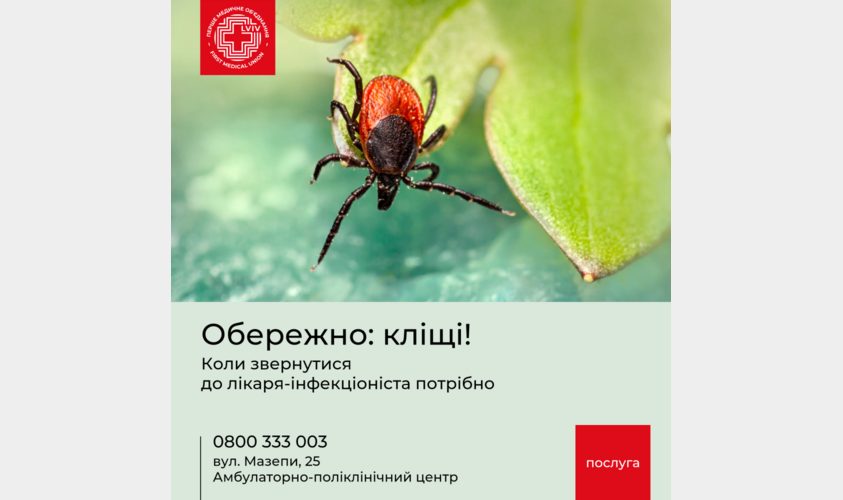The peaks of tick activity occur every year in April-May and August-September. The bite of a tick, in fact, is not felt, because its saliva contains a kind of anesthesia, but the problems from such a bite can be serious.
The First Medical Association of Lviv reminds you how to protect yourself, recognize an infectious infection in case of a bite and where to seek help.
Ticks carry several dangerous infectious diseases. The most common of them is Lyme disease. It is also called tick-borne borreliosis. Every year, from two to almost five thousand Ukrainians fall ill with this disease. Lyme disease can lead to severe complications and even disability.
“Ticks are attached to people not only during their stay in nature, but also after. They can get into the house, leaving on clothes, belongings or pets, or even with a bouquet of wildflowers. And later – spill over into the human body,” the First Medical Association of Lviv explains.
How to protect yourself from bites:
– in green zones – wear closed, tight, light-colored clothes and a hat;
– use sprays and creams that repel these insects;
– after a walk, check clothes and body for ticks.
If you still find a tick on your body, we recommend that you contact the doctors of the nearest trauma center. Specialists categorically do not advise to remove the insect yourself, because there is a high risk of its incomplete removal.
“Infection is unlikely if the tick has been on the skin for less than 24 hours. If it takes longer, contact your family doctor. If necessary, he will recommend that you conduct an immunoenzymatic blood test to detect antibodies to borreliosis, or other examinations, and may prescribe prophylactic antibiotics. If you got the tick yourself, but over time you noticed a worsening of your health, you should immediately consult a doctor,” explains the First Medical Association of Lviv.
The most common symptoms of Lyme disease include:
– red spots on any areas of the skin;
– pain in muscles and joints;
– headache;
– fever;
– difficulty concentrating and sleep disturbances.
The manifestation of the disease begins precisely with redness of the skin – erythema in the form of a round spot in a circle. In the case of late treatment, the infection can affect not only the skin, but also the nervous system, musculoskeletal system, and heart.
Treatment should take place under the supervision of an infectious disease specialist. The infectious disease specialist of the First Medical Association receives patients in the outpatient polyclinic center on the street. Mazepy, 25. And you can conduct an immunoenzymatic blood test to detect antibodies to borreliosis in the case of a tick bite at any of the hospitals of the First TMO: St. Panteleimon’s Hospital (9 Mykolaichuka St.); St. Luke’s Hospital (23 Navrotsky St.); Saint Nicholas Hospital (4 Orlyka St.). Contact center: 0800 333 003.
Remember! Timely contact to the doctor and diagnosis – preserve health and save lives!

